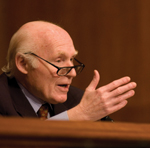Biomedical researchers receiving grants from the National Institutes of Health would face tougher disclosure rules under an amendment to the economic stimulus bill introduced by Sens. Chuck Grassley (R-IA) and Herb Kohl (D-WI).
The legislation would require NIH to toughen its enforcement of conflict of interest policy and mandate that all grantees receiving funds in excess of $250,000 disclose the amount of the primary investigator’s significant financial interest in companies relevant to the research. The grantee institution would have to furnish a detailed report on how it would manage the primary investigator’s conflict of interest.
Sen. Grassley, ranking member of the Senate Committee on Finance, said in a statement: “The goal of this initiative is to establish transparency and the accountability that comes from disclosure. It’s become clear that the federal rules in place to manage conflicts of interest in research aren’t enforced as they ought to be, and there’s an opportunity to strengthen them here, as well.”
Kohl, who chairs the Senate Special Committee on Aging, said: “The government has a right to know whether the scientists it funds have a financial stake in the outcome of their research.”
The economic stimulus bill, the senators noted, would add billions to the $24 billion in grants the NIH currently awards each year for biomedical research.








